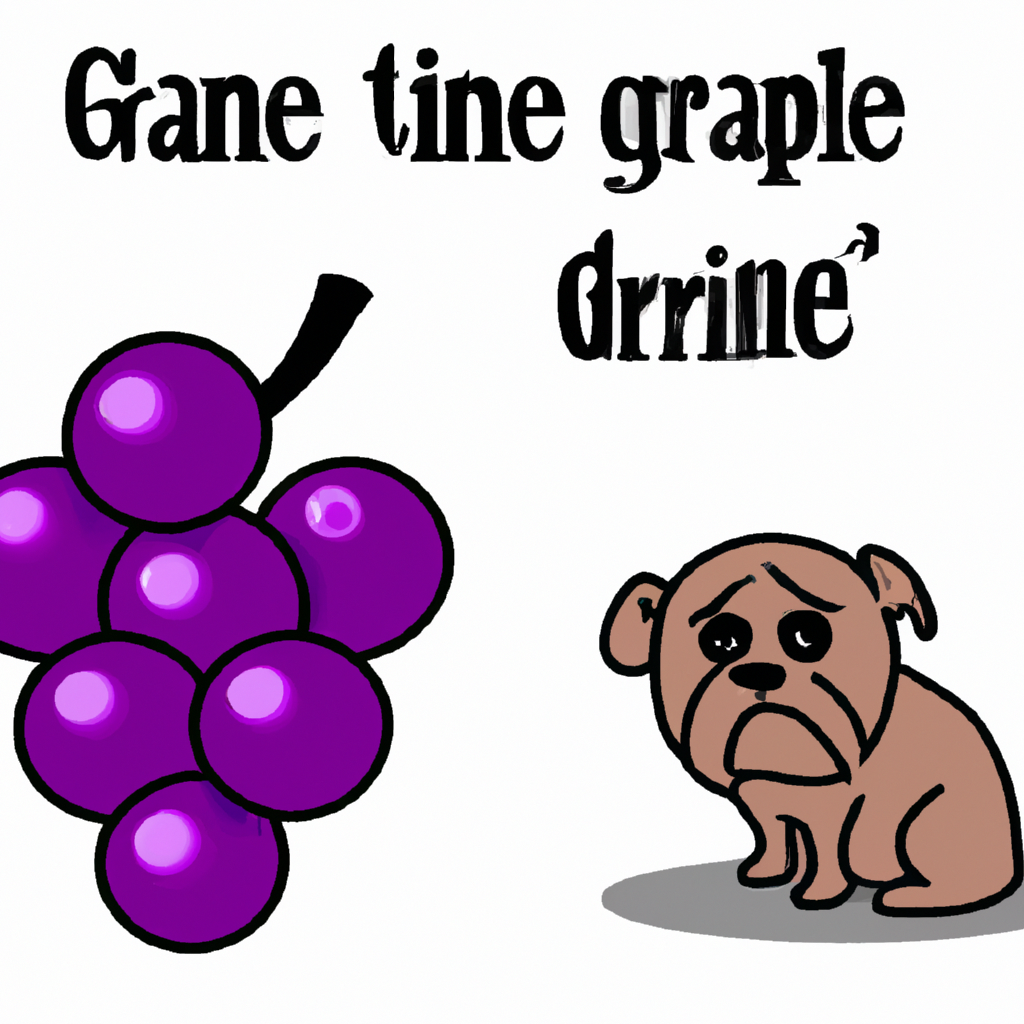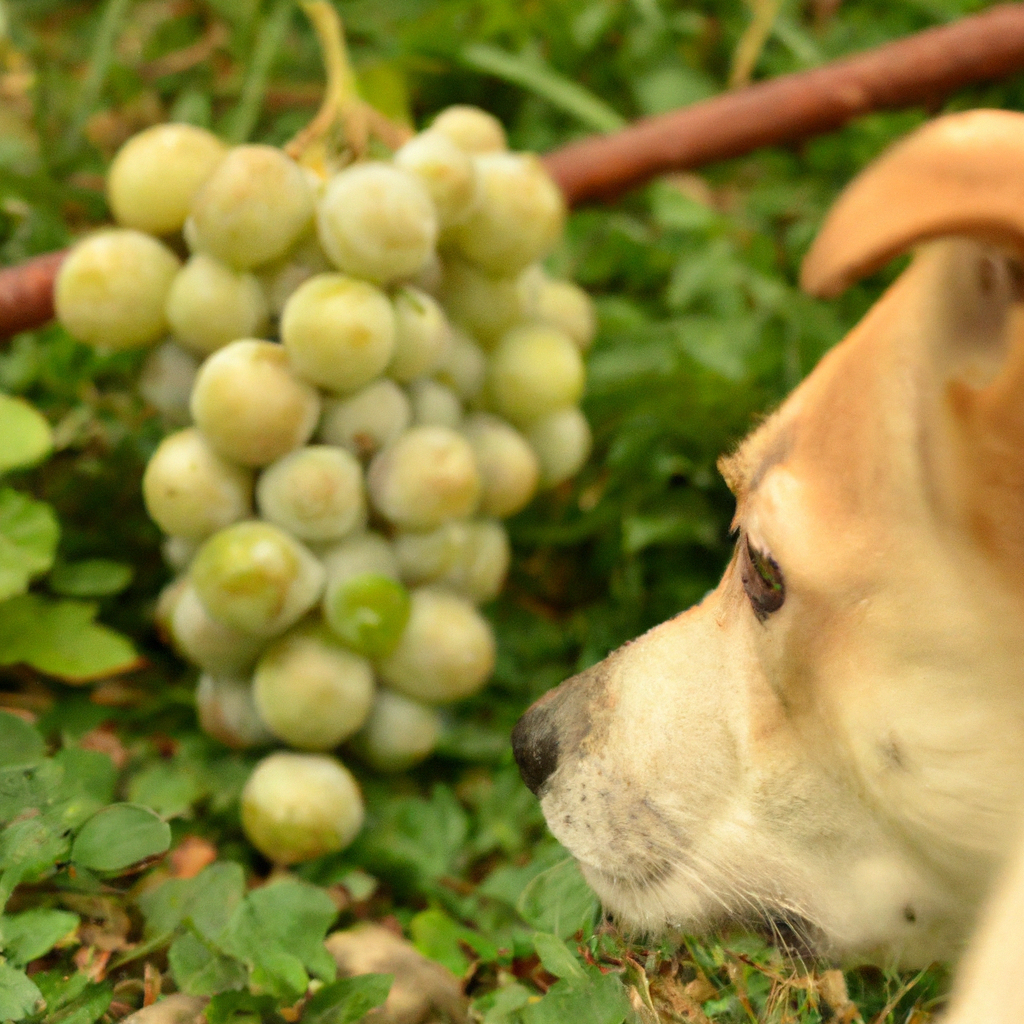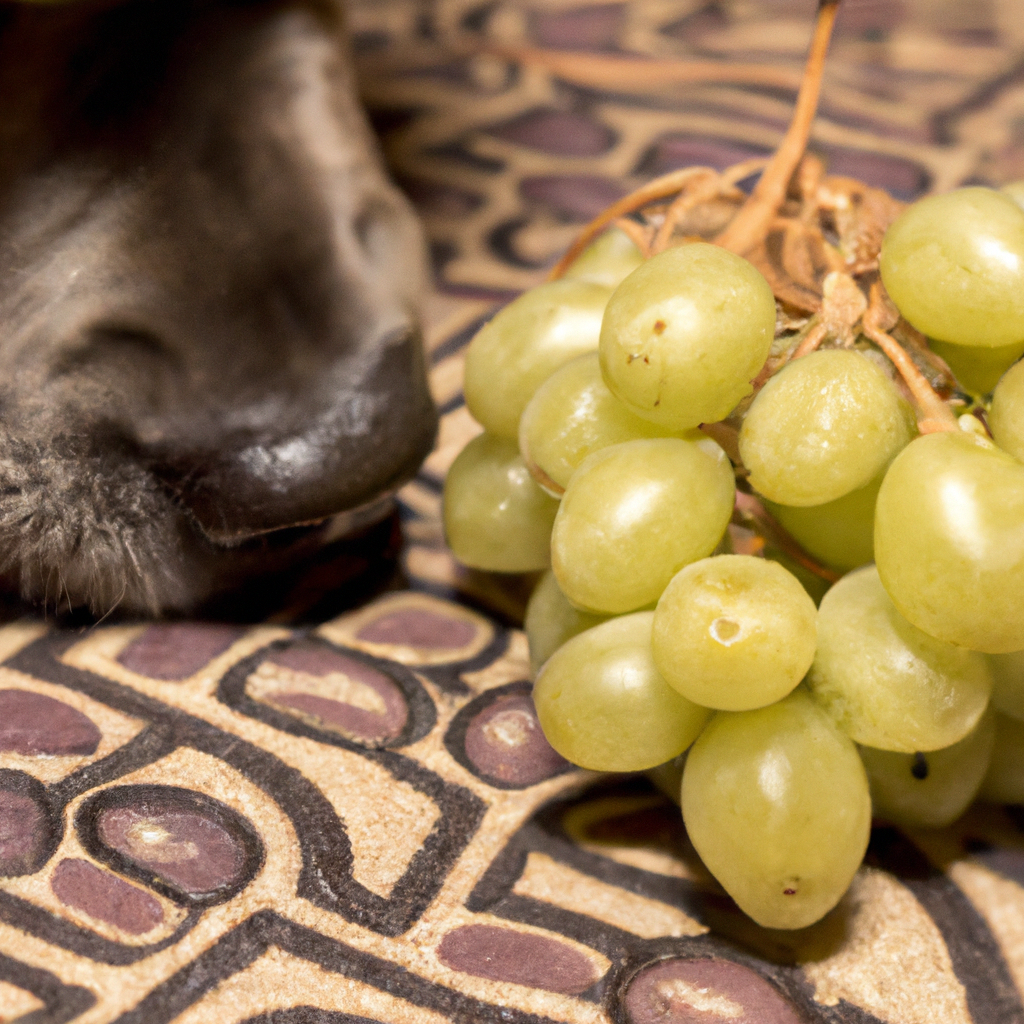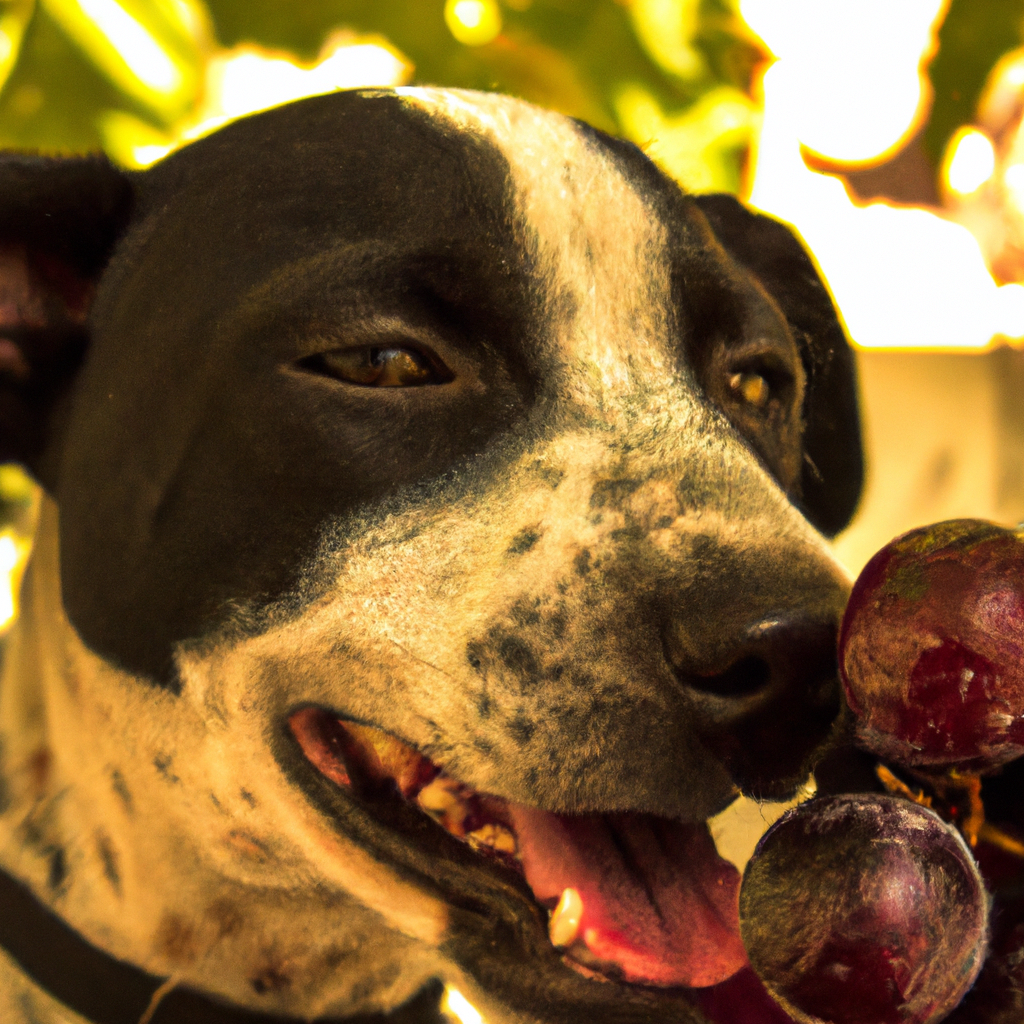Are you a dog lover? If so, there’s a high chance that you’ve shared a meal or two with your furry friend. There’s something heartwarming about your dog enjoying the food you love. However, it’s crucial to understand that not all human foods are safe for dogs. In fact, some can be deadly. One such food that has been a topic of great concern among veterinarians and pet owners is the seemingly harmless grape. Can a single grape really kill a dog?
Picture this: A grape rolling off your kitchen counter and your dog gobbling it up before you can reach it. A harmless accident, right? Wrong! The ingestion of even a single grape can lead to severe health complications in dogs, including acute kidney failure. The exact cause of the toxicity remains unknown, making it all the more dangerous. As a responsible pet owner, it is truly essential to be aware of these potential dangers and take necessary precautions to ensure the safety of our beloved pets.

Overview of Grapes and Raisins
As an avid dog lover, you may have a new dog or a senior dog, and it’s essential to know the potential risks associated with their diet. Understanding the overview of grapes and raisins can help you in making informed decisions for your dog’s diet. Grapes can be a tempting treat for your pets, but can they safely eat them? Some dogs can experience grape toxicity with symptoms like abdominal pain and kidney failure, even from a single grape. You may be wondering, “Are Grapes and Raisins Safe for Dogs?
Are Grapes and Raisins Safe for Dogs?
Moving from the general to the specific, let’s delve into a topic that every new dog owner may encounter, namely: Are Grapes and Raisins Safe for Dogs?
If you’re an avid dog lover, you might believe that sharing your snacks, like grapes and raisins, with your dog is a harmless act of love. But, as dog breeders and pet enthusiasts will tell you, these seemingly innocent fruits can spell disaster for your beloved pet.
Ingesting even a single grape or raisin can cause severe health problems for some dogs, including kidney failure, which may ultimately kill them. Some dog kidney cells are particularly sensitive to grape toxicity, and symptoms such as abdominal pain and poor health can emerge within just a few hours of grape ingestion.
Health Benefits
Stepping lightly from our previous discourse, let’s delve into the health benefits of grapes and raisins. Imagine, if you will, the exquisite flavor and the joyous burst of healthful goodness within each single grape or raisin. Both these fruits offer incredible benefits to humans – from cardiovascular protection offered by grape juice to the high fiber content in raisins that aids digestion.
However, for our canine companions, this narrative changes drastically. Grapes and raisins are not safe for dogs. Ingested grapes can lead to sudden kidney failure and may kill your dog. Dog breeders and owners, do not be misled by the health benefits these fruits offer to us humans.
Remember, what’s good for us may not be good for them. Dog care must prioritize the health of our four-legged friends – even if this means placing restrictions on their diet.
Risks and Allergies
Leaving the vineyard of grape varieties, we now cross into a thicket of concern for our canine companions. Risks and Allergies linked to grape ingestion in dogs is a topic that tugs at the heart of every responsible dog owner.
Many dog breeders know that grapes and raisins can be lethal to dogs. Grape ingestion can lead to severe health complications, even death. One grape or a handful of raisins ingested by your dog could cause acute kidney failure. This is true for all dog breeds and sizes, from the smallest terrier to the largest farm dog.
Even if your dog has ingested grapes in the past without any apparent harm, it isn’t an indication that any grapes are safe. The toxic substance in grapes and raisins is unpredictable. Some dogs may eat grapes once and suffer no ill effects, while for others, one grape may kill.
No amount of grape or raisin is safe for your dog.
Symptoms of Grape or Raisin Poisoning in Dogs
The consequences of grape or raisin poisoning in dogs can be dire. Vomiting and diarrhea are among the first symptoms. But, don’t dismiss these as ordinary dog ailments; the severity and time frame of these symptoms can indicate a far more serious problem. Even the best dogs with the best dog care can fall prey to ingestion of grapes or raisins. Additionally, physical changes, such as poor health or changes in your dog’s kidney cells, may be alarming signs. It’s essential for dog breeders and owners to recognize these symptoms early. A veterinary diagnosis involves a thorough evaluation of your pet’s health.

Vomiting and Diarrhea
Shifting from the basic overview of grapes and raisins, let’s delve into a vivid illustration of the first alarming signs of grape or raisin poisoning in dogs. Understanding these symptoms may just save your dog’s life.
As a responsible dog owner, the first thing to look out for is vomiting and diarrhea. The severity of these symptoms may vary from dog to dog. Your dog, whether it’s a farm dog, a large dog, or an apartment dog, may exhibit severe vomiting or diarrhea upon ingestion of any grapes or raisins.
Don’t underestimate the damage that can be caused by even one grape. It is a myth that only large quantities cause harm. Even small amounts can be devastating to dogs, especially smaller breeds. This is not just about your dog’s discomfort, it’s about the potential threat to their life.
As the best dog owner, it’s your job to ensure the safety of your dog, be it from training products, dog grooming, dog sports, or dietary restrictions.
Severity of Symptoms
While it’s delightful to share a fun moment with your best dog, feeding them grapes or raisins can lead to fatal consequences. Let’s dive into the severity of symptoms your dog may experience if they’ve ingested these fruits.
Be it a large dog or one with a name as unique as the terrier, the severity of symptoms varies. However, if your dog ingested grapes, it’s crucial to seek immediate veterinary care. The severity may range from lethargy and dehydration to kidney failure or even death. A single grape can be deadly, and the risk intensifies if your dog is small or already has health issues.
Dog kidney cells are particularly vulnerable to the toxins in grapes. The severity of symptoms is directly linked to the number of grapes and the dog’s size, breed, age, and overall health. Some dogs might appear fine after consuming a grape, but irreversible kidney damage may already be underway.
Time Frame for Symptoms
Transitioning from the general overview of grapes and raisins, it’s crucial to understand the timeline of symptoms if your dog accidentally ingests these harmful substances.
The scary fact is, symptoms of grape or raisin poisoning in dogs can occur as early as two hours after ingestion, though in some dogs it might take up to 24 hours. It’s a ticking time bomb and every minute counts. In a situation where your dog’s health is on the line, knowing the time frame for symptoms can be a lifesaver.
Imagine this, you’re sitting in your apartment, sipping some grape juice while surfing the internet for the best dog names, or perhaps looking up dog sports for your two dogs. Suddenly, your dog gobbles up one grape that fell. You might think it’s harmless, but it’s a hidden danger that can lead to severe kidney damage.
In the world of responsible dog ownership, knowledge and quick action can make all the difference. Your dog’s life could depend on it.

Why Grapes and Raisins Are Toxic to Dogs
Understanding the toxic effects of grapes and raisins on our best dogs is crucial for responsible dog ownership. Oligomeric Procyanidins (OPCs), found in grapes, have been found to have toxic effects on dog kidney cells. It’s vital to recognize symptoms of grape poisoning in dogs, as some dogs, regardless of dog names or breeds, might show signs such as vomiting, lethargy, or loss of appetite. Even a small amount of grapes can be toxic to your dog, and the role of size and breed is significant.
Oligomeric Procyanidins (Opcs)
It’s a heart-wrenching moment when you realize that your beloved pet could be in danger. This danger lurks where you’d least expect it – in a bag of seemingly harmless grapes or raisins. The culprit behind grape toxicity in dogs is a compound known as Oligomeric Procyanidins (OPCs).
OPCs are naturally occurring compounds found in a variety of plants including bearded dragons, but their concentration in grapes is especially harmful to some dogs. Even the best dogs with the most unique dog names are not immune. Regardless if you have two dogs or a single dog sports enthusiast, the threat is real.
Grapes may be small, but the OPCs they contain can cause significant damage. These compounds can lead to mineral deposits forming in your dog’s kidneys, ultimately causing kidney failure. Even seemingly harmless activities like virtual dog sports can become a threat if grapes are used as a treat.
Symptoms of Grape Poisoning
Now that we’ve identified the symptoms of grape poisoning in dogs, let’s delve deeper into what actually makes grapes so lethal to our beloved furry friends.
When you’re scrolling through popular dog names for your new pet or browsing dog sports intro for your competitive pup, it’s necessary to keep in mind that some common human foods, like grapes and raisins, can be incredibly dangerous to your dog. In fact, consumption of these foods can lead to acute kidney failure, a serious condition that requires immediate kidney medication and intensive dog care.
Just a small amount of these fruits can trigger symptoms like vomiting, diarrhea, lethargy, and loss of appetite. In severe cases, it can even lead to sudden kidney failure. It doesn’t matter if you have an apartment dog or a bearded dragon; all pets need to be protected from this risk.

Amount of Grapes Toxic to Dogs
As you flip through your family dog program cgc, deciding on potential dog names, take a moment to realize the immense responsibility that comes with owning a pet. Among the many things to be aware of, is the quantity of grapes and raisins that can be toxic to your dog. It’s a jarring fact that even a small amount can cause severe health issues, including kidney failure.
The amount of grapes that can harm a dog varies greatly and can depend on various factors such as the dog’s breed, size, and overall health. For some dogs, ingesting even a single grape can be deadly. For others, it might take a few. However, as a responsible owner, it is essential to err on the side of caution and prevent any consumption at all.
Remember, your kid’s best dogs or even your dog apartment dogs are not immune to this danger.
How to Prevent Grapes and Raisins Poisoning
Preventing grape and raisin poisoning in your dog is imperative. Firstly, restrict access to grapes and raisins, whether they are in the dog grooming dog shop or your home. Recognizing symptoms of poisoning is essential; prompt action can save your dogs dog sports dog. If ingestion occurs, knowing the immediate steps to take is vital. Don’t wait for your dog sports intro or virtual dog sports session to take action. Regular vet check-ups are crucial, especially if your pet is a senior dog health flea or dog apartment dogs breed.
Restrict Access to Grapes and Raisins
Understanding the lurking danger of grapes and raisins to your beloved pooch is the first step. But now, let’s delve into effective ways to prevent any tragic incidents. One of the most crucial steps is to restrict access to grapes and raisins for your dog.
You may enjoy grapes as a healthy snack and perhaps use raisins in your baking. But remember, what is healthy for you could potentially kill your dog. So, be mindful about where you store these fruits. Keep them in high cabinets or the fridge, places your dog can’t reach, even if they’re proficient in their dog sports.
If you have grapevines in your garden, consider fencing it off or supervising your dog during their outdoor time. As a family dog program cgc suggests, it’s better to be safe than sorry when it comes to your pet’s health.
Additionally, if you have kids, ensure they understand the risks.
Read more about orange peels and dried blueberries for dogs
Recognizing Symptoms of Poisoning
After understanding the grave danger that grapes and raisins pose to our beloved canine companions, it becomes crucial to know how to recognize if your dog has ingested these toxic fruits. Recognizing the symptoms of poisoning is a crucial step in safeguarding your pet’s health.
Firstly, look out for sudden changes in your pet’s behavior. If your usually active dog sports canine partner is suddenly lethargic and uninterested in virtual dog sports, it could be a warning sign. In addition, if your usually well-groomed pet, who you take pride in dog grooming, starts vomiting or suffering diarrhea, it’s high time to seek immediate help.
In more severe cases, your dog may begin to show signs of dehydration, loss of appetite, or even abdominal pain. These symptoms indicate a severe toxicity that can kill if not treated promptly.
Remember, your dog’s health is as important as your own. Don’t ignore these warning signs.
Immediate Steps After Ingestion
With the knowledge that grapes and raisins are toxic to your four-legged friend, it’s crucial to know the immediate steps to take if your dog ingests these dangerous fruits. As a responsible dog owner, you should always be prepared for such emergencies.
Firstly, do not panic. Your calmness is vital in handling the situation effectively. Identify the ingested substance; if it’s grapes or raisins, bear in mind that they can cause kidney damage and even kill your dog.
Once identified, immediately contact your vet or an emergency pet poison helpline. Give them as much information as possible about your dog (breeds, weight, any pre-existing conditions, etc.), and the amount of grapes or raisins ingested. This will help them determine the severity of the situation and the necessary course of action.
If advised by the vet, induce vomiting. This can be done using a 3% hydrogen peroxide solution, but never without the vet’s guidance.
Diagnosis and Treatment of Grapes and Raisins Poisoning
A thorough veterinary evaluation is the initial step towards saving your beloved dog from the fatal effects of grapes and raisins poisoning. This includes a rigorous veterinary diagnosis process, providing evidence of the poisoning. Additionally, emergency treatment options may be life-saving in such critical circumstances. To ensure complete recovery, constant monitoring of kidney function is crucial since these toxins primarily affect the kidneys. Enhance your dog care knowledge with preventive measures, which include awareness on training products, dog gift items, and dog sports that can inadvertently expose your pet to these toxins.
Veterinary Evaluation
While prevention is undoubtedly the best cure for grape and raisin poisoning, there are instances where our furry friends might accidentally ingest these harmful substances. In such cases, the first step is a Veterinary Evaluation.
It’s important to act promptly and take your dog to the vet as soon as you suspect he might have ingested grapes or raisins. This is not just a matter of dog sports and dog grooming, but a critical step to ensure the health and longevity of your beloved pet.
Vets are equipped with training products, dog gifts, and more importantly, the necessary knowledge and skills to diagnose and treat your pet effectively. They can evaluate your dog’s condition, check for symptoms, and immediately start emergency treatment if necessary.
Remember, every minute counts. Don’t gamble with your dog’s health. Whether your dog is a terrier or a hairless dog for apartments, whether he’s a champion in dog sports, or just the best dog for your kids, he deserves immediate veterinary attention.
Veterinary Diagnosis Process
Transitioning from the realm of prevention, let’s now delve into the crucial topic of the veterinary diagnosis process for grapes and raisins poisoning in dogs. As a responsible pet owner, understanding this process can be the difference between life and death for your beloved canine companion.
The initial step in the diagnosis process is often a comprehensive discussion between you and your vet. This exchange will involve questions about the dog’s exposure to raisins or grapes, the amount ingested, any symptoms observed, and even potentially related topics like dog grooming routines, dog sports intro, or dog sports canine partners.
Continuing, your vet might recommend blood tests to detect any mineral deposits or changes in kidney function. If your dog is a senior, the vet may also check for senior dog health flea or other conditions.
It’s important to remember that early diagnosis and treatment can drastically improve outcomes.

Emergency Treatment Options
After having discussed preventive measures, let’s navigate through the tumultuous waters of emergency treatment options for dogs who have consumed grapes or raisins. It’s a harsh reality that our canine partners can fall prey to such a dangerous situation, but quick and decisive action can make all the difference.
Remember, time is of the essence. As soon as you find that your dog has ingested grapes or raisins, immediately take them to a veterinary clinic. The vet will likely administer a dog-friendly version of kidney medication to combat potential renal failure.
The treatment might also involve inducing vomiting to rid your dog’s body of the toxic substance. This can be a stressful time for both you and your dog. Therefore, it’s crucial to stay calm and trust in the assistance of professionals.
Lastly, don’t let the fear of advertising fees deter you from seeking immediate medical help. Your dog’s health and life are worth every penny.
What to Do if Your Dog Ate Grapes or Raisins
When dealing with a situation where your beloved canine partner has eaten grapes or raisins, immediate action is crucial. Firstly, induce vomiting immediately to prevent further absorption of toxins. Look out for symptoms of grape poisoning in dogs such as lethargy and diarrhea. Don’t wait, seek immediate veterinary treatment. Remember, your dog’s life is at stake. Long-term effects of grape ingestion can be fatal. As responsible pet owners, we must educate ourselves on the dangers lurking in our kitchens.
Induce Vomiting Immediately
Having understood the dangers and treatments for grape and raisin poisoning in dogs, the immediate question that arises is, “What do I do if my dog ate grapes or raisins?” To answer that, one must first understand the golden rule of immediate action: Induce Vomiting Immediately.
Imagine you have just returned from a session of dogs dog grooming dog or from an exciting round of dogs dog sports dog. You find your terrier happily chewing on a bunch of raisins that your child dropped or you find that your senior dog has found its way into the grapes on the kitchen counter. In such a scenario, every second counts! Your first immediate action should be to induce vomiting. This is not a pleasant thought, but it is essential to protect your dog’s health and even save their life.
Don’t wait for the symptoms of grape poisoning in dogs to appear.
Immediate Actions to Take
In the wake of understanding the perils of grapes and raisins, it’s time to elucidate the immediate actions one should take when their canine companion has ingested these toxic fruits. If you are a dog owner, involved in dogs dog sports, or simply a concerned neighbor, this information is crucial.
Firstly, do not wait for symptoms of grape poisoning in dogs to appear. Time is of the essence, and your quick action could save your dog’s life. Seek immediate assistance from your nearest vet, be it the senior dog health flea clinic or akc terrier speciality centers.
While waiting for professional help, try to induce vomiting immediately, but only if your dog has ingested the grapes or raisins within the last two hours.
Remember, getting your dog to the vet is paramount. It is far more important than browsing through dog gift shop dog products, or educating yourself on bearded dragons and other articles. Treat this situation with the urgency it requires.
Symptoms of Grape Poisoning in Dogs
Transitioning from the nitty-gritty of diagnosis and treatment, let’s delve into understanding the symptoms of grape poisoning in dogs. Noticing these signs early could be a game-changer for your canine partner.
Dogs dog grooming dog or dogs dog sports dog, every breed can be affected, from the playful terrier to the stoic Akita. Inadvertently, your kids best dogs could ingest grapes or raisins – a seemingly harmless act with potentially lethal consequences.
So, what symptoms should you be on the lookout for? Initial signs may include vomiting, diarrhea, and lethargy, followed by a loss of appetite, dehydration, and a decrease in urine production. These are symptoms that should never be ignored.
Whether you find this information from other articles or affiliate links with advertising fees, remember, recognizing these symptoms in your dog can save its life.
Conclusion
In conclusion, it is absolutely essential to keep your beloved pets safe from the hidden dangers of grapes and raisins. Their toxicity to dogs is not a myth, but a scientifically proven fact. No matter how small the amount consumed, the risk of renal failure and other serious health complications cannot be underestimated.
Let’s take action, spread awareness and ensure our furry friends’ safety. Educate others about the lethality of these common fruits to dogs. Your vigilance can save a life. Think twice before you share your fruit salad next time.
